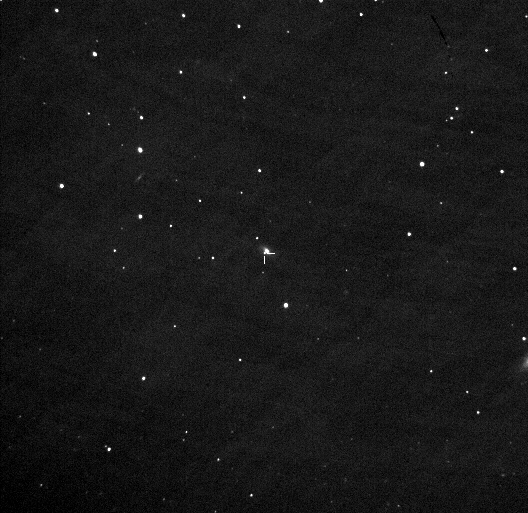SN 2014ap (A.R., 11 30 13.37 Dec. +24 10 07.2), scoperta il 20 marzo 2014 nella galassia pgc 35452 (offset 5E 7S), magnitudine 16.5, tipo: Ia (ATEL 6001)
SN individuata da F. Ciabattari, S. Donati, E. Mazzoni, G. Petroni and M. Rossi con il telescopio Newton da 50cm dell'Osservatorio di Monte Agliale (Lucca).

Electronic Telegram No. 3856 Central Bureau for Astronomical Telegrams INTERNATIONAL ASTRONOMICAL UNION CBAT Director: Daniel W. E. Green; Hoffman Lab 209; Harvard University; 20 Oxford St.; Cambridge, MA 02138; U.S.A. e-mail: Questo indirizzo e-mail è protetto dallo spam bot. Abilita Javascript per vederlo. (alternate Questo indirizzo e-mail è protetto dallo spam bot. Abilita Javascript per vederlo. ) URL http://www.cbat.eps.harvard.edu/index.html Prepared using the Tamkin Foundation Computer Network SUPERNOVA 2014ap IN PGC 35452 = PSN J11301337+2410072 F. Ciabattari, S. Donati, E. Mazzoni, G. Petroni, and M. Rossi, Borgo a Mozzano, Italy, report their discovery of an apparent supernova (mag 16.5) on unfiltered CCD images (limiting magnitude 19.5) obtained on Mar. 20.89 UT with a 0.5-m Newtonian telescope + FLI4710 Proline camera. The new object is located at R.A. = 11h30m13s.37, Decl. = +24d10'07".2 (equinox 2000.0; UCAC-2 reference stars), which is 5" east and 7" south of the center of the galaxy PGC 35452. Nothing is visible at this position on their survey images from Mar. 2012 (limiting mag 19.5) or on the digitized plates of the Palomar Sky Survey from 1992 Apr. 27 (F plate; limiting mag 20.3) and from 1995 Apr. 22 (J plate; limiting mag 20.3). The variable was designated PSN J11301337+2410072 when it was posted at the Central Bureau's TOCP webpage and is here designated SN 2014ap based on the spectroscopic confirmation reported below. Additional CCD magnitudes for 2014ap: Mar. 22.240, 16.5 (Joseph Brimacombe, Cairns, Australia; remotely using a 43-cm telescope at the New Mexico Skies observatory near Mayhill, NM, U.S.A.; position end figures 13s.26, 05".9; image posted at URL https://www.flickr.com/photos/43846774@N02/13376859234/); 22.828, V = 15.7 (N. James, Chelmsford, Essex, England; Celestron 11 telescope + ST9XE camera; position end figures 13s.28, 06".2); 23.956, 16.0 (Gianluca Masi, Francesca Nocentini, and Patrick Schmeer, remotely using a 43-cm telescope near Ceccano, Italy; position end figures 13s.27, 06".3); 28.900, V = 17.0 (Massimiliano Martignoni, Magnago, Italy; 0.25-m f/10 reflector; position end figures 13s.30, 06".2). M. Childress, R. Scalzo, F. Yuan, B. Schmidt, Australian National University (ANU); and B. Tucker, ANU and University of California at Berkeley, report spectroscopic classification of PSN J11301337+2410072 = SN 2014ap via a 40-min spectrogram taken on Mar. 22.6 UT with the Wide Field Spectrograph (cf. Dopita et al. 2007, Ap. Space Sci. 310, 255) on the ANU 2.3-m telescope at Siding Spring using the B3000/R3000 gratings (wavelength range 350-980 nm at 0.1-nm resolution). The spectrum indicates that 2014ap is a type-Ia supernova around maximum light. Classification with SNID (Blondin and Tonry 2007, Ap.J. 666, 1024) shows a good match to SN 2002er at phase -1 day, and the preferred SNID redshift is about 0.023, consistent with the apparent host galaxy (z = 0.0235; Falco et al. 1999, PASP 111, 438). Si 635.5-nm and a relatively weak Si 597.2-nm feature (indicating a slow decline rate) are evident, as well as Ca H and K and the infrared triplet, the sulfur W, and the characteristic iron complex near 500.0 nm. Accounting for the host redshift, they measure a Si 635.5-nm expansion velocity of 11800 km/s. NOTE: These 'Central Bureau Electronic Telegrams' are sometimes superseded by text appearing later in the printed IAU Circulars. (C) Copyright 2014 CBAT 2014 April 21 (CBET 3856) Daniel W. E. Green




